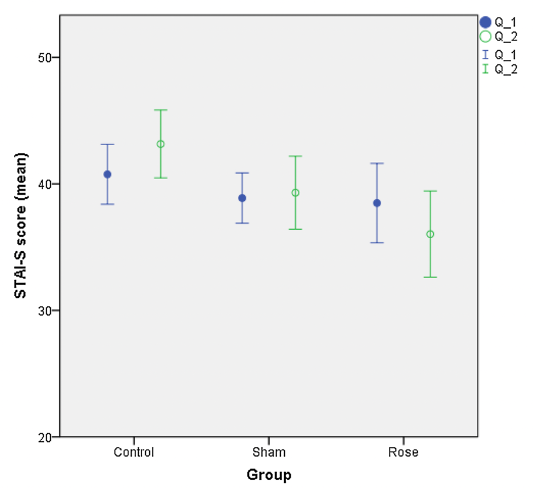Preoperative anxiety is a common problem before anesthesia. A group of researchers studied the effect of aromatherapy with Rosa damascena Mill. oil on preoperative anxiety. This study was a prospective, randomized, controlled trial. The patients (n = 99) were randomized into a control group (group C), a sham group (group S), and a rose oil group (group R). Group C did not receive any intervention, group S used a mixture (distilled water/ethyl alcohol) and group R used a mixture (distilled water/ethanol/0.2 mL of Rosa damascena Mill. oil), using an ultrasonic aromatic diffuser. The State-Trait Anxiety Inventory- State Questionnaire of Spielberger (STAI-S) was used to determine anxiety levels. The first STAI-S (Q_1) was administered in the otorhinolaryngology clinic in the morning on the day of the operation. Subsequently, aromatherapy was applied by an ultrasonic nebulizer for 15 minutes before patients went to the operating room for surgery in group S and group R. In the operating room, the second STAI-S (Q_2) were recorded. It was found that there was no statistically significant difference in terms of Q_1 scores between the groups at baseline, but when the second STAI- S was performed after the intervention, there was a statistically significant difference in terms of Q_2 scores between groups C and R (as shown in the following figure).

Pain is a common complication after surgery. Another group of researchers evaluated the effect of aromatherapy with Rosa damascena Mill. oil on postoperative pain in children. The experiment was a double-blind, placebo-controlled clinical trial in which 64 children aged 3-6 years were selected by convenience sampling and randomized into two groups. Patients in group A were given inhalation aromatherapy with Rosa damascena Mill. oil, and those in group B were given almond oil as a placebo. The inhalation aromatherapy was applied at the first moment of the subjects’ arrival in the ward and then at 3, 6, 9, and 12 hours thereafter. Also, common palliative treatments to relieve pain were used in both groups. Thirty minutes after aromatherapy, children’s postoperative pain was evaluated with the Toddler-Preschooler Postoperative Pain Scale (TPPPS). Data were statistically analyzed using the Chi-square test, one-way analysis of variance (ANOVA), and repeated measures ANOVA. Results revealed no significant differences in pain scores between the two groups of subjects when they first arrived at the ward (before receiving any aromatherapy or palliative care). After each session of aromatherapy and at the end of treatment, the pain score was significantly reduced in the aromatherapy group with Rosa damascena Mill. compared to the placebo group.
The results of the two studies suggest that aromatherapy with Rosa damascena Mill. oil reduced preoperative anxiety in patients undergoing septoplasty or rhinoplasty. This method can also be used to reduce postoperative pain in children without any significant side effects when used together with other common treatments.
Marofi, M., Sirousfard, M., Moeini, M., & Ghanadi, A. (2015). Evaluation of the effect of aromatherapy with Rosa damascena Mill. on postoperative pain intensity in hospitalized children in selected hospitals affiliated to Isfahan University of Medical Sciences in 2013: A randomized clinical trial. Iranian journal of nursing and midwifery research, 20(2), 247. [Link]
Dagli, R., Avcu, M., Metin, M., Kiymaz, S., & Ciftci, H. (2019). The effects of aromatherapy using rose oil (Rosa damascena Mill.) on preoperative anxiety: A prospective randomized clinical trial. European Journal of Integrative Medicine, 26, 37-42. [Link]
